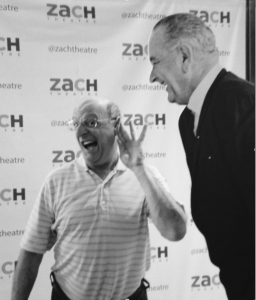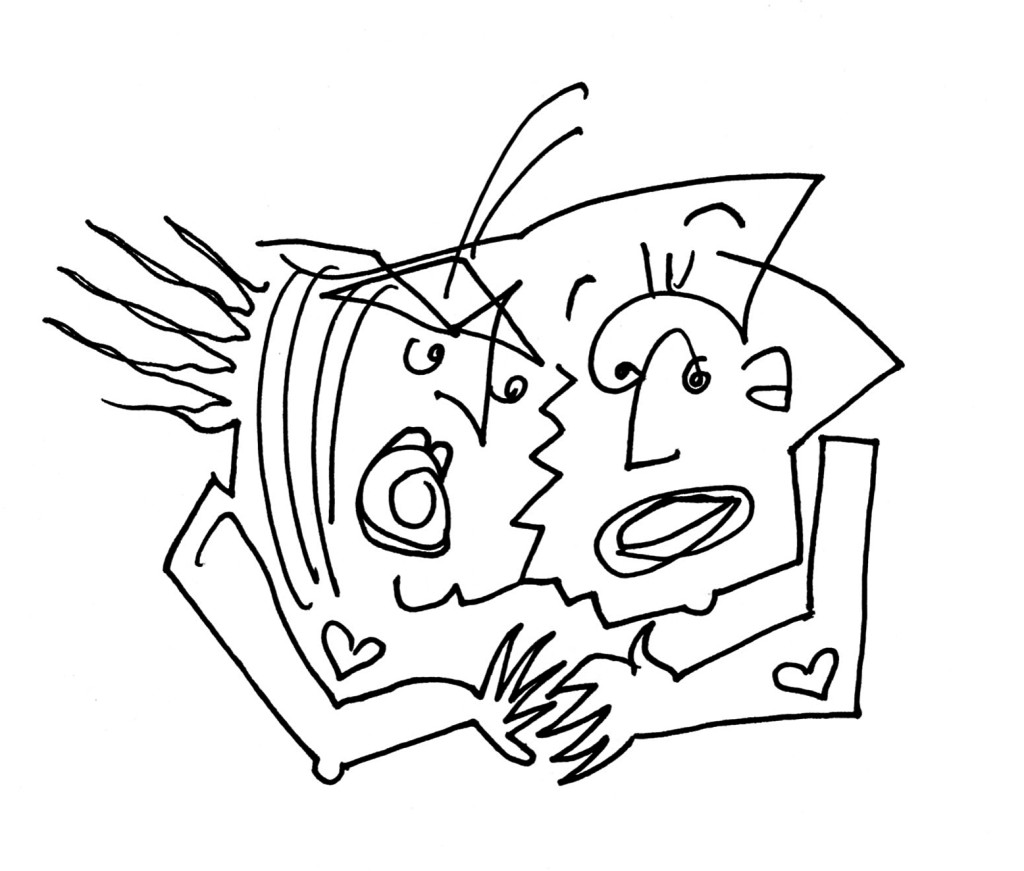 Listening to President LBJ turn it up in Austin, TX
Listening to President LBJ turn it up in Austin, TX
If one person in a conversation takes the rhetorical levels up to 10 every time, the other person has to rebut at Level 10 and turn monstrous, or retreat into resentful silence. Rhetorical passion, which feels so good, can destroy conversation and mar truth and reconciliation. David Brooks, NY Times Dec 15 2015
Hello again, your neighborhood WalkyTalky here, listening like a folk journalist to people like Lyndon Baines Johnson above, U.S. President 1963-1968; well, that’s a reasonable facsimile thereof standing cardboard lifelike outside the play, “All The Way” by Robert Schenkkan in Austin last spring.
And my biggest fear for the longest time? The fear of having a bad conversation.
My whole body felt bad afterwards, it was like trying to titrate off anti-depressives with my insides going jiggly bzzzzz all over.
Not a good feeling. And during awful chats, are you like me? Do you feel flushed with thoughts flashing through you like, Beam me up please I beg of you, let’s the two of us you and me just wallow off into some other sector goodbye cruel world…
Right?
I felt like I was the only conversational taking-parter in the world who had ever suffered through one like this. Or ever made mistakes.
“We made too many wrong mistakes,” is a line from the great Yogi Berra I obviously hadn’t learned yet. Now, as you get older you get more relaxed (especially if you remember to quote more Yogisms) and you realize: that’s how intense youth is.
In youth, every line you try is like a pitch in the playoffs – so much seems to be riding on it. When you want to say what’s really on your mind — and why not, what’s the point of conducting a real conversation? — you speak your mind, you go to extremes. You let it all out in a howling howling howl, living like what Tropic of Capricorn* author Henry Miller meant when he wrote: “The main thing in life is not to understand it or mold it or even love it…but to drink of its undying essence. Round and round one goes, always over the same ground, always returning to the dead center: the unacceptable now.”

Whew.
Enough with the arguing, later in life of course, you learn to keep it in. (“Sit Down And Shut Up!” was recurring mocking rejoinder on Stephen Capen’s radio shows when I produced him in San Francisco and New York) I’m not saying that’s necessarily a good thing, keeping it in more, because of course the more and more you keep in the more you may eventually collapse from your insides and fall to your knees because of what life has done to you, until only by wailing out in shuddering screams re it all may you wake the rest of you up inside.
But think about it. Everyone is looking for an honest conversation. Why? Because nothing’s more refreshing than that. And if you are honestly open about yourself – “try it, they’ll like it”—you might feel better, too.
Or as Sarah Hepola, personal essay editor at Salon put it in her book* *: “The big arc of all personal essays is it’s all their fault and then I realize it’s all mine.”
So best to fess up Parker!
* Henry Miller’s more popular novel is Tropic of Cancer. I like Tropic of Capricorn from 1961, banned in USA for 30 years, which opens with: “Once you’ve given up the ghost, everything follows with dead certainty, even in the midst of chaos.”
http://www.goodreads.com/book/show/250.Tropic_of_Capricorn
* * Hepola’s memoir: http://www.nytimes.com/2015/07/01/books/review-sarah-hepolas-blackout-on-the-darkness-that-took-over-her-life.html
Well, while I’m here, I’ll do the work. And what’s the work? To ease the pain of living. Everything else, drunken dumbshow. Allen Ginsberg